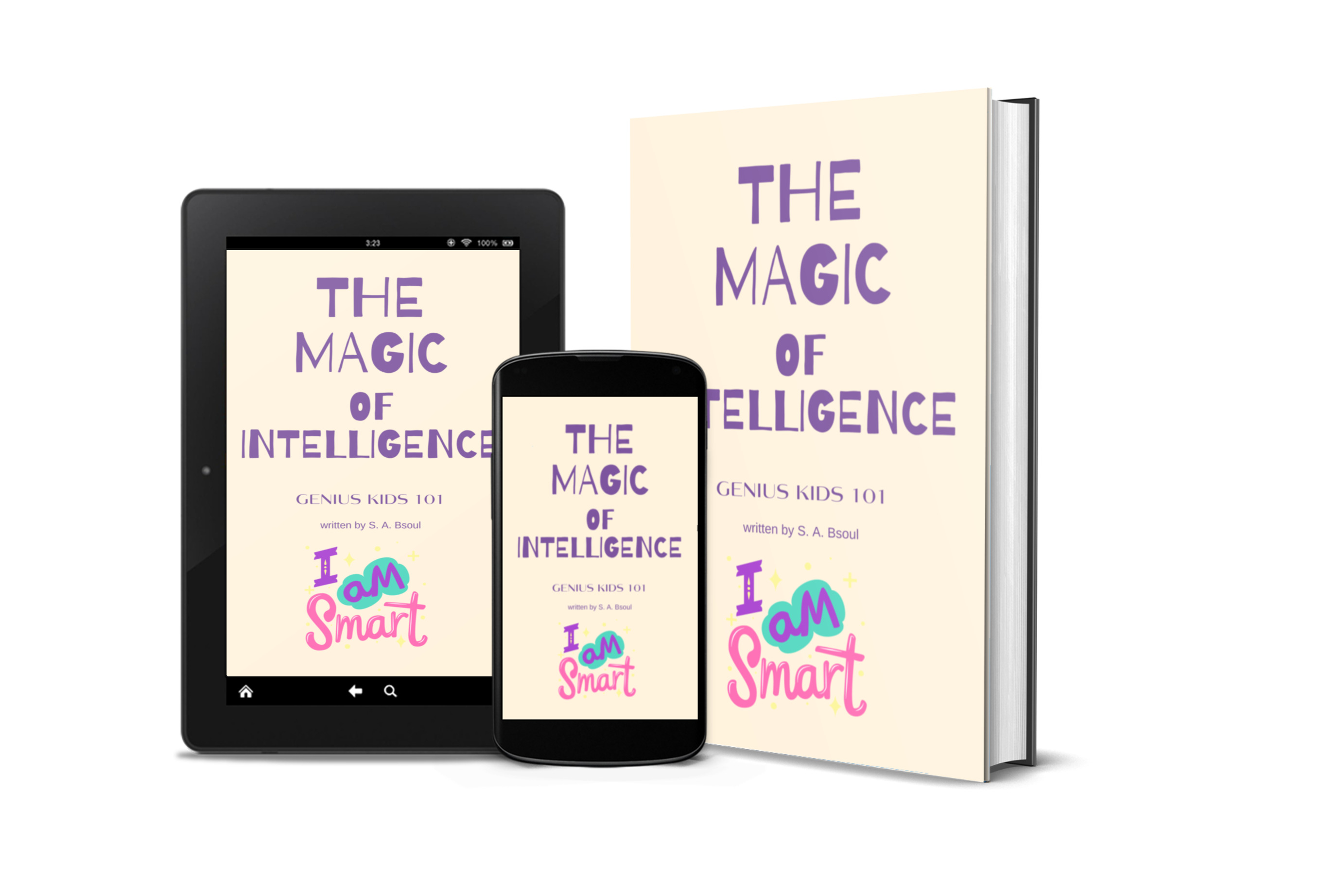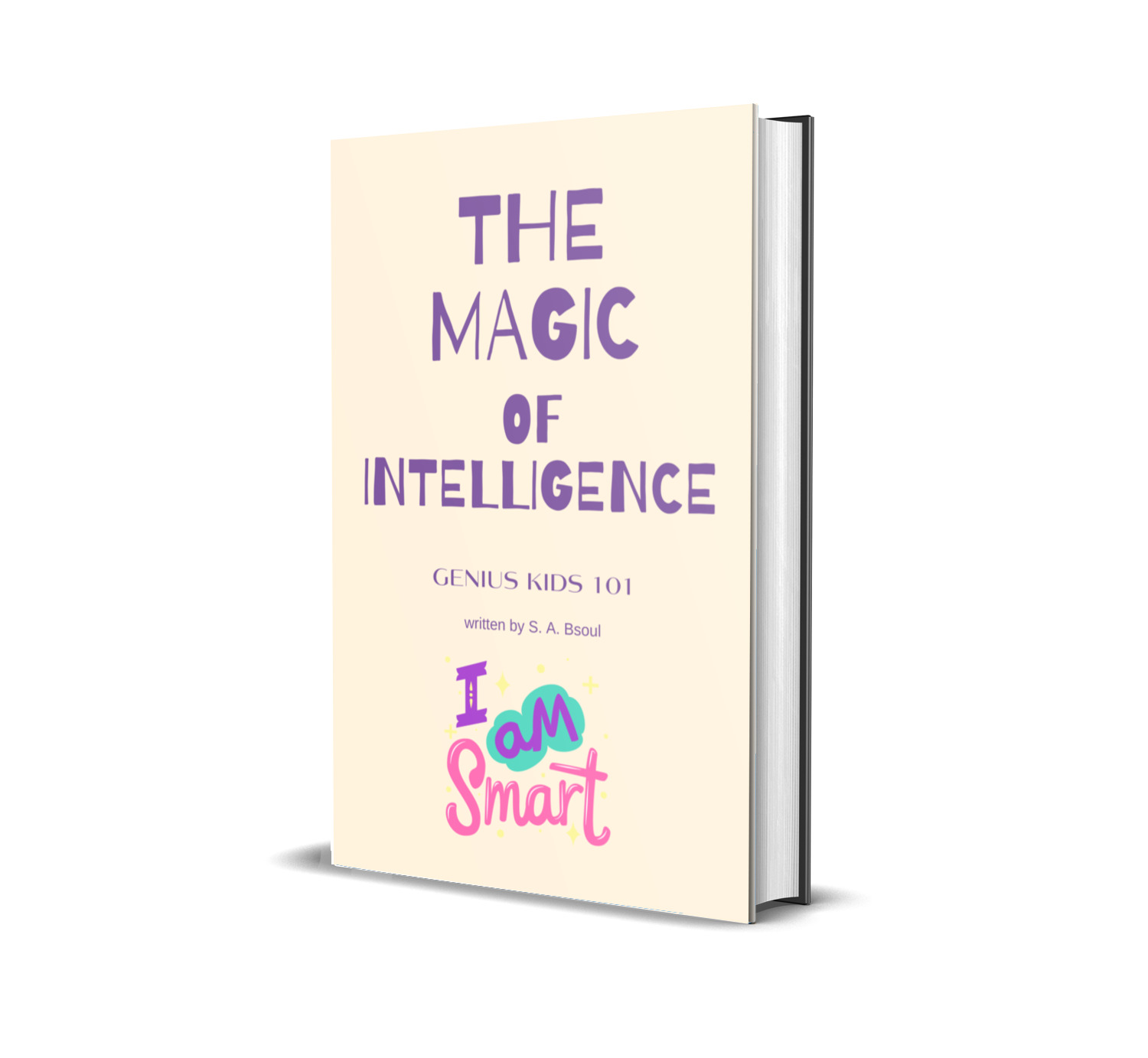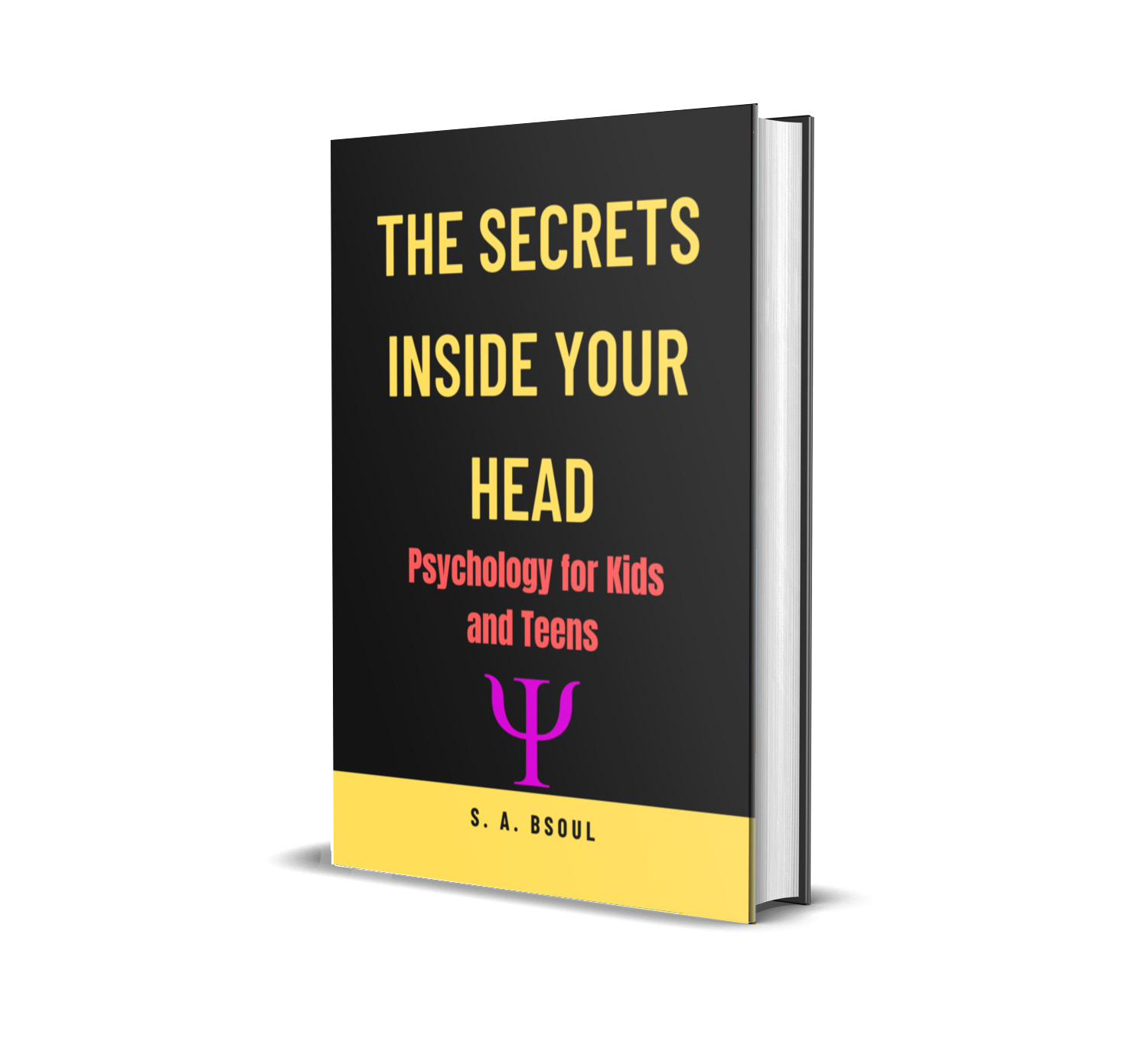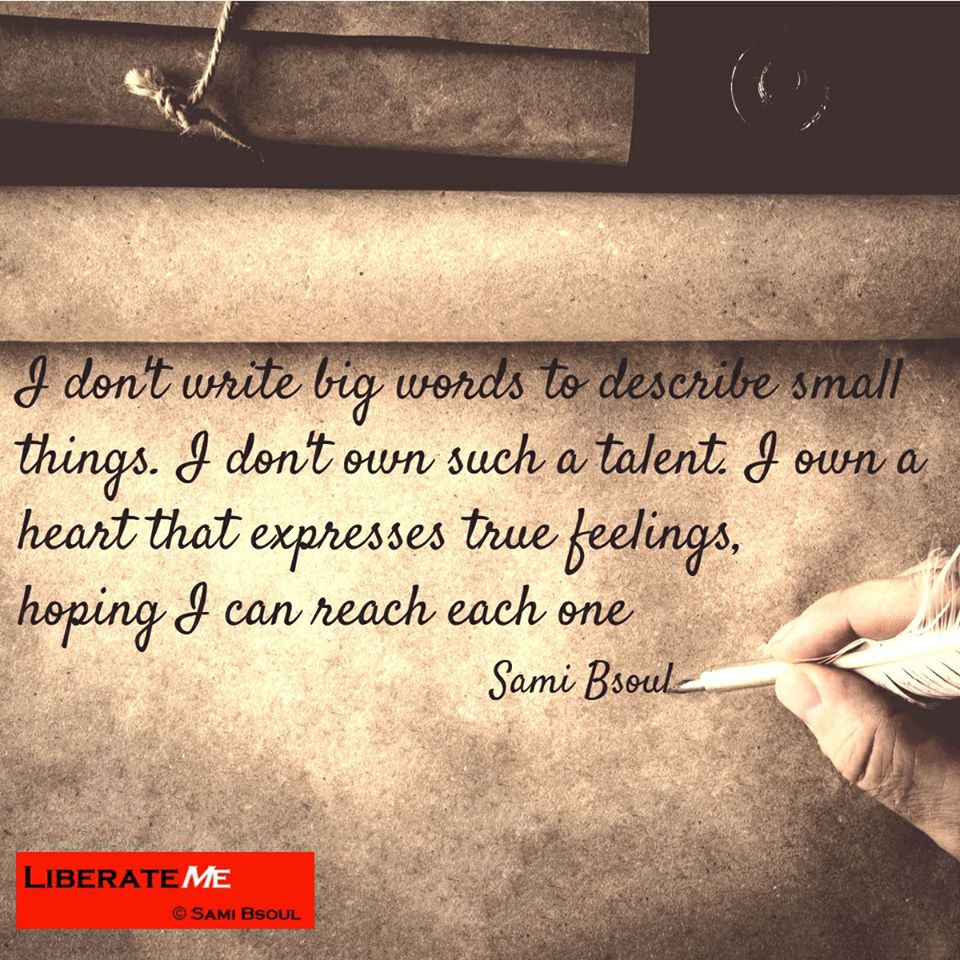The Magic of Intelligence
In the magical world of "The Magic of Intelligence" you're about to embark on an incredible adventure like no other.
This journey unveils the fascinating realm of intelligence, designed to captivate curious minds. But here's the amazing secret: this book isn't just for a specific age group; it's a timeless source of wisdom and inspiration for readers of all ages.
What's even cooler about this book is that it uses colourful text to highlight important stuff. It makes it easier to remember and keeps your attention.

Understanding Intelligence and IQ
This book takes the complex idea of intelligence and IQ and explains it in simple terms, as clear as a mountain stream. It demystifies IQ tests and encourages young readers to see intelligence as a multifaceted gem with countless facets waiting to be explored. This perspective on intelligence is a valuable lesson for everyone, reminding us that intelligence goes beyond just a number.

The book simplifies various concepts about intelligence, including what it is, the different types of intelligence, theories about it, the role of the brain, and many other ideas related to intelligence, all explained in easy-to-understand language.
A Gift from Parents to Children
As parents, we all want to see our children shine, help them discover their unique potential, and thrive. "The Magic of Intelligence" is a special gift you can give your child, not to set them apart from others, but to guide them in recognizing their extraordinary abilities.
In a world that continually evolves and offers new challenges, equipping our children and students with a profound understanding of intelligence is of paramount importance. And, there's no better way to do that than through the enlightening pages of "The Magic of Intelligence." This remarkable book serves as a guiding beacon, helping us demystify the concept of intelligence for our kids and teenagers.
The Many Faces of Intelligence
"The Magic of Intelligence" dives headfirst into the captivating realm of intelligence, shedding light on its multifaceted nature. Intelligence isn't confined to acing exams; it's an intricate tapestry of abilities, talents, and potential. This book unveils the myriad ways intelligence manifests itself, making it relatable for young minds.
The Brain's Role in Intelligence
Understanding the brain's role in intelligence is essential for both children and teens. This book presents this complex topic in an accessible way, making it easier for young readers to grasp the connection between their brains and their intelligence.
Intelligence in Everyday Life
Intelligence is not confined to the classroom; it's an integral part of our daily existence. "The Magic of Intelligence" seamlessly bridges the gap between theoretical knowledge and practical application, making it relevant to a child's everyday experiences.
Intelligence Can Grow
One of the most empowering lessons this book imparts is that intelligence is not fixed; it can grow and develop over time. This message instills hope and encourages a growth mindset among young readers.
Developing Your Intelligence
The book provides practical insights and strategies for nurturing and enhancing one's intelligence, giving kids and teenagers valuable tools for personal growth.
Learning Styles and Intelligence
Understanding how different learning styles connect with intelligence helps children and teenagers discover the most effective ways to absorb and apply knowledge.
Intelligence in School
For teachers and parents alike, this book sheds light on the importance of fostering an environment that celebrates diverse forms of intelligence within the educational system.
Emotional Intelligence
The book also delves into the vital realm of emotional intelligence, offering insights on how to navigate social and emotional challenges effectively.
Intelligence Around the World
Through a global perspective, "The Magic of Intelligence" opens young minds to the diverse ways intelligence is perceived and valued in various cultures.
The Importance of Mistakes
Mistakes are stepping stones to learning, and this book emphasizes their importance in the journey to intelligence.
Your Intelligence Journey
Every child's intelligence journey is unique, and this book encourages them to embrace their individuality.
Intelligence Testing
It unravels the mysteries of intelligence testing, offering clarity on what these assessments truly measure.
Fun Facts about Intelligence
Sprinkled throughout the book are fun and intriguing facts about intelligence that are sure to captivate young readers.
The book "The Magic of Intelligence" addresses various questions and many more topics, including:
1. How can you explain to kids and teenagers what intelligence is?
2. How can you describe the idea of "general intelligence" (or "g") to children?
5. How can you help children understand the concept of "Book Smart" and its importance in learning?
6. How can you explain "Street Smart" to kids and why it's valuable for solving real-world problems?
7. How would you describe "Creative Intelligence" to children and encourage their creativity?
10. How can you describe to teenagers the role of intelligence in planning for their future?
12. How can you make the idea of "general intelligence" relatable to children and teenagers?
16. How can you introduce Thurstone as a brain explorer who wanted to understand how our minds work?
17. How can you describe "Word Fluency" to kids?
18. How can you help children understand "Verbal Comprehension"?
19. How can you explain "Numerical Ability" to kids?
20. How can you make "Spatial Visualization" understandable to children?
21. How can you describe "Perceptual Speed" to kids?
22. How can you explain the concept of "Memory" in simple terms?
23. How can you introduce "Inductive Reasoning" to kids?
26. How can you introduce Howard Gardner as a mind explorer?
28. How can you describe "Linguistic Intelligence" to kids?
29. How can you explain "Logical-Mathematical Intelligence" to kids?
31. How can you describe "Musical Intelligence" to kids?
32. How can you explain "Bodily-Kinesthetic Intelligence" in a way that children can relate to?
33. How can you introduce "Interpersonal Intelligence" to kids?
34. How can you describe "Naturalist Intelligence" to children?
35. How can you emphasize to kids that most activities involve a mix of different intelligences?
42. How can you explain "Analytical Intelligence" to kids?
43. How can you describe "Creative Intelligence" to kids?
44. How can you introduce "Practical Intelligence" to children?
47. How can you help kids understand "Adaptation"?
48. How can you explain "Shaping" to kids?
49. How can you introduce the concept of "Selection" to children?
53. How can you simplify the concept of Fluid Intelligence and make it relatable to children?
54. How can you describe the role of logic and abstract thinking in Fluid Intelligence?
55. How can you simplify the concept of Crystallized Intelligence and make it relatable to children?
57. How can you explain to kids and teenagers what the Cattell-Horn Theory is all about?
58. How can you make Creative Intelligence relatable to children?
59. How can you explain Social Intelligence in a way that kids and teenagers can grasp?
60. How can you simplify the idea of Academic Intelligence?
61. How can you introduce Emotional Intelligence?
62. How can you make Problem-Solving Intelligence understandable for kids and teenagers?
72. How can you inspire kids and teenagers to enhance their spatial intelligence through activities?
85. How can you explain to kids and teenagers the concept of Self-Awareness and why it is important?
86. How can you explain to kids and teenagers what they can do to develop their Self-Awareness?
87. How can you explain to kids and teenagers what IQ tests are?
94. How can you explain to kids and teenagers what an IQ (Intelligence Quotient) score is?
Other publications




© Samibsoul.com 2023

